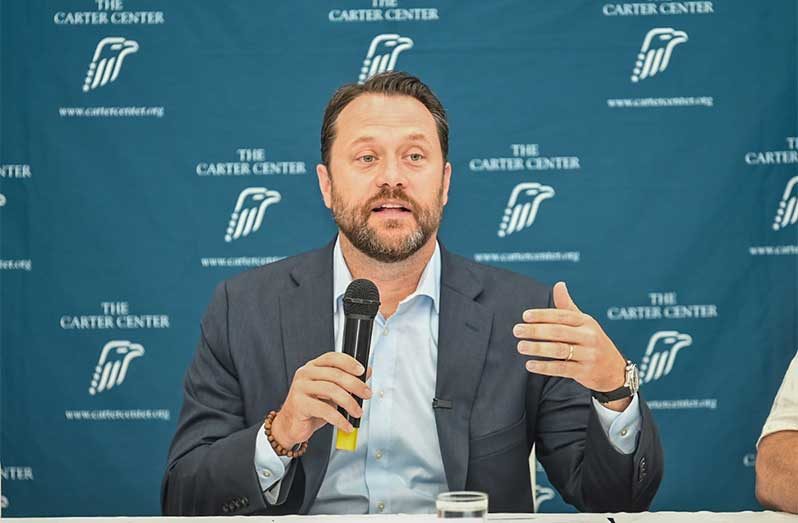— says no significant irregularities reported during the polling day
THE Carter Center, in its preliminary report following polling day activities on Monday, stated that there was no evidence indicating any manipulation of Guyana’s official list of electors (OLE).
“We did not find any evidence that the list was manipulated,” Mission leader, Jason Carter, said while responding to questions from the local press at a Wednesday news conference.
Voting took place at 2,790 polling stations across the country. The OLE consisted of 757,690 voters.
“There is, of course, just looking at the numbers, you know that there are people who could come off of that list because they don’t exist, probably, you know, because they’ve passed away,” Carter said, noting that while there is a need for continuous and robust reforms, no significant irregularities were reported during the casting of ballots.
“Guyana should be very proud of its elections and of its democracy. Guyana is a vibrant democracy, and yes, there are some persistent issues that have undermined trust between the parties at different times, and that lack of trust is very important, but Guyana is a robust democracy, and the people of Guyana truly embrace their democratic values.”
He added, “This is an important moment, and this is an important place, and that’s why we have called for years on Guyana’s leaders in this new government and the new parliament, whoever they may be, to continue crucial discussions around constitutional reform.”
The mission observed 234 polling stations and 17 tabulation centres, finding no significant irregularities.
“97 per cent of the reports that we’ve received regarding tabulation recorded that tabulation was being conducted in accordance with the law. So that process is cumbersome, but it is ongoing, it is transparent, and when it’s complete, I think people will have trust in the results,” he said.
The team will remain in Guyana to observe the ongoing tabulation process.
The Carter Center highlighted the need for greater transparency, particularly in relation to public access to information about government contracts and other matters that directly impact citizens’ daily lives. Ensuring equal access to such information, the organisation noted, is vital to building public trust and accountability.
He further underscored that while elections are an important gauge of a country’s democratic health, they are not democracy in its entirety. “Elections are really a report card on a democracy.”
Carter stressed that what happens between elections, including governance, lawmaking, and institutional strengthening, is equally, if not more, important.
The Carter Center also called on Guyanese authorities to continue implementing and upholding the legal framework that governs the electoral process, reinforcing that these laws are central to maintaining democratic integrity and public confidence in political institutions.



.jpg)








